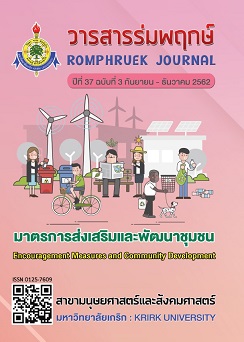The Sufficiency Economy Movement in Nongmaisung Sub-district Administrative Organization with the Participation of Nongmaisung Temple, Nongmaisung Sub-district Administrative Organization and the Office of Community Development Uthai District, Phranakhon Si Ayutthaya Province
Main Article Content
Abstract
This research aimed to 1) Study the Sufficient Economy Movement in the Area of Nongmaisung Sub-district Administrative Organization with the participation of Nongmaisung Temple, Nongmaisung Sub-district Administrative Organization and the Office of Community Development District. 2) Support and jointly drive the Sufficiency Economy in the Area of Nongmaisung Sub-district Administrative Organization. The research are combined (Mix Methods Research) both qualitative research and quantitative research. The results showed that 1) the Sufficient Economy Movement in the Area of Nongmaisung Sub-district Administrative Organization with the participation of Nongmaisung Temple, Nongmaisung Sub-district Administrative Organization and the Office of Community Development District should start with the development of personnel in the community to understand the activities of the Sufficient Economy “the foundations of life is called 6*2” 2) Support and jointly drive the Sufficiency Economy in the Area of Nongmaisung Sub-district Administrative Organization with the expansion and development of the network. by promoting exchanges, learning and evaluation with 4 criteria, 23 indicators.
Article Details
Every article published in the Romphruek Journal of the Humanities and Social Sciences is the opinion and point of view of the authors. Thery're not the viewpoint of Krirk University or the editored department. Any part or all of the articles for pablication must be clearly cited.
References
กรมการพัฒนาชุมชน กระทรวงมหาดไทย. (2552). พัฒนาหมู่บ้านเศรษฐกิจพอเพียงให้เป็นหมู่บ้านต้นแบบ.
(25 August 2016) สืบค้นจาก http://www.cdd.go.th/.
ณัฏฐพงศ์ ทองภักดี. (2550 ก). ปรัชญาของเศรษฐกิจพอเพียง : ความเป็นมาและความหมาย.
วารสารพัฒนบริหารศาสตร์, 47(1),1-25.
ณัฏฐพงศ์ ทองภักดี. (2550 ข). การบริหารการพัฒนา : บูรณาการตามกรอบปรัชญาของเศรษฐกิจพอเพียง
ในปรัชญาของเศรษฐกิจพอเพียงกับการบริหารการพัฒนา. วารสารพัฒนบริหารศาสตร์, 47(1), 408-420.
นิภาพร กลิ่นเกตุ. (2557). ยุทธศาสตร์การขับเคลื่อนปรัชญาเสรษฐกิจพอเพียงกับประสิทธิผลของสถานศึกษา
สังกัดสำนักงานเขตพื้นที่การศึกษาประถมศึกษาสุพรรณบุรี เขต1. คณะครุศาสตร์อุตสาหกรรม
มหาวิทยาลัยราชมงคลธัญบุรี, กรุงเทพฯ.
แผนพัฒนาเศรษฐกิจและสังคมแห่งชาติ ฉบับที่ 11 (พ.ศ. 2555-2559). (2554). “สรุปสาระสำคัญ”.
(1 สิงหาคม 2559) สืบค้นจาก www.nesdb.go.th/plan11_thai.pdf.
พระครูสุจิณธรรมนิวิฐ (สมจิตร อธิปญฺโญ). (2554). บทบาทพระสงฆ์ในการพัฒนาคุณภาพชีวิตของชุมชน : กรณีศึกษา
คณะสงฆ์ อำเภอลอง จังหวัดแพร่. บัณฑิตวิทยาลัย มหาวิทยาลัยมหาจุฬาลงกรณราชวิทยาลัย, พระนครศรีอยุธยา.
พระมหาประยูร ธิรวํโส และ คณะ. (2549). บทบาทของพระสงฆ์กับเศรษฐกิจพอเพียง : กรณีศึกษาบ้านท่าสว่าง จังหวัดสุรินทร์,
สัจจะสะสมทรัพย์ จังหวัดตราด และโครงการเมืองสหกรณ์ จังหวัดกาฬสินธ์. คณะมนุษยศาสตร์
มหาวิทยาลัยมหาจุฬาลงกรณ์ราชวิทยาลัย, พระนครศรีอยุธยา.
สมนึก ภัททิยธานี. (2546). การวัดผลการศึกษา. กาฬสินธุ์ : ประสานการพิมพ์.
สัญญา จารุจินดา. (2551). แนวทางการบริหารจัดการในการน้อมนำแนวคิดเศรษฐกิจพอเพียงสู่การปฏิบัติในโรงเรียนประถมศึกษา อำเภอขุนยวม จังหวัดแม่ฮ่องสอน. คณะครุศาสตร์ มหาวิทยาลัยราชภัฏเชียงราย, เชียงราย.
Chunsom, N. (2012). Business and Sufficiency Economy Philosophy. (25 August 2016) Retrieved from http://cse.nida.ac.th/main/index.php?lang=th.
Isarangkura, A. (2013) . Operating according to the principles of sufficiency economy in the government system. (25 August 2016) Retrieved from http://cse.nida.ac.th/main/index .php?lang=th.
Jarujinda, S. (2008). Management Approach to Sufficiency Economy Implementation in
Primary Schools in Khun Yuam District, Mae Hong Son Province.
Faculty of Management Studies Chiang Rai Rajabhat University, Chiang Rai.
Lorchirachoonkul, V. and Jitthavech, J. (2012). Development of indices and indicators for
sustainable development At the regional level of Thailand. (25 August 2016) Retrieved from http://cse.nida.ac.th/main/index.php?lang=th.
Mongsawad, P. and Ariyaarpakamol, N. (2012). Fifteen Years after the Crisis : Have We Been on
the Sufficiency Economy Path?. NIDA Development Journal, 54(1), 77-105.
Phra Paisan Visalo. (1986). Buddhism with Contemporary Value.
Bangkok : Komolkeemthong Foundation Publishing.


